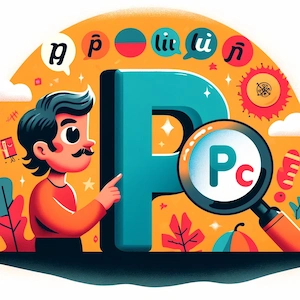Spanish words starting with P: A Comprehensive Guide
Embarking on the journey of learning a new language can be thrilling, and when it comes to Spanish, mastering the vocabulary is a fundamental step. One of the keys to unlocking a richer lexicon is to understand the significance of words starting with each letter, and in this case, the letter 'P'.

From powerful verbs to picturesque adjectives, Spanish words starting with 'P' offer a diverse array of expressions to enhance your communication skills. Dive into the essence of Spanish language and culture as we explore the essential words that begin with this consonant.
- What are common Spanish nouns starting with 'P'?
- How to use Spanish verbs beginning with 'P'
- Enhance your descriptions with adjectives that start with 'P'
- Adverbs in Spanish starting with 'P': When and how to use them
- Spanish words starting with 'P': A quiz to test your knowledge
- The historical evolution of the letter 'P' in Spanish
- Related questions on Spanish words starting with 'P'
What are common Spanish nouns starting with 'P'?
When learning a new language, starting with nouns can be incredibly helpful. Essential Spanish nouns starting with P include everyday items and concepts that are crucial for daily conversation. Here are a few:
- Palabra (word)
- Puerta (door)
- Paz (peace)
Nouns such as 'persona' (person) and 'problema' (problem) are also frequently used in discussions. By incorporating these nouns into your vocabulary, you'll be better equipped to describe the world around you.
Understanding these nouns is not only about memorization but also about seeing them in context. For instance, 'película' (movie) can be used when discussing entertainment, while 'pescado' (fish) is common in food-related conversations.
Spanish words start with Q - search & filter all words in Spanish dictionaryHow to use Spanish verbs beginning with 'P'
Verbs are the backbone of language, enabling us to express actions and states of being. Verbs beginning with P for Spanish learners are plentiful, and here's how to use some of them:
- Pensar (to think)
- Pasar (to pass, to happen)
- Producir (to produce)
Each verb has its own set of conjugations and nuances. 'Pintar' (to paint) is a regular verb, so it follows the typical conjugation pattern, while 'pedir' (to ask for) is stem-changing, which requires a different approach.
Practice these verbs by forming sentences, such as "Él piensa en su futuro" (He thinks about his future) or "Nosotros pasamos tiempo juntos" (We spend time together).
Enhance your descriptions with adjectives that start with 'P'
Adjectives breathe life into language by describing and modifying nouns. Adjectives in Spanish with P for description can add color and emotion to your sentences:
- Precioso (beautiful)
- Pequeño (small)
- Potente (powerful)
Using these adjectives, you could say "Vivo en una pequeña ciudad" (I live in a small city) or "El motor es muy potente" (The engine is very powerful). Remember that adjectives in Spanish must agree in gender and number with the nouns they describe.
Unveiling the Longest Spanish Word and Its UsageAdverbs in Spanish starting with 'P': When and how to use them
Adverbs are versatile tools that modify verbs, adjectives, or other adverbs. Learn Spanish adverbs with letter P to refine your sentences with details about how, when, and where actions take place:
- Pronto (soon)
- Posiblemente (possibly)
- Perfectamente (perfectly)
For example, "Él llegará pronto" (He will arrive soon) or "Ella lo entiende perfectamente" (She understands it perfectly). These adverbs can significantly enhance your conversational skills.
Spanish words starting with 'P': A quiz to test your knowledge
Quizzes are a fun way to test your understanding and retention of vocabulary. Test your vocabulary with Spanish P words quiz to see how much you've learned. Try to match the following Spanish words with their English translations:
- Planta (______)
- Pintura (______)
- Pregunta (______)
Whether you're a beginner or an advanced learner, quizzes can be a valuable part of your study routine, offering a moment of self-assessment and reinforcement of your growing Spanish vocabulary.
The historical evolution of the letter 'P' in Spanish
The letter 'P' holds a fascinating place in the Spanish language, with its historical significance stemming from Latin and earlier roots. Understanding the evolution of words can deepen your appreciation for the language and its history.
Discover 5 letter Spanish words: Easily search & filter all Spanish words with 5 lettersFor instance, the word 'padre' (father) comes from the Latin 'pater', showing a direct lineage. Similarly, 'país' (country) has its origins in the Latin word 'paganus', which had a different meaning in ancient times.
The historical journey of words not only enriches your vocabulary but also gives you insight into the culture and evolution of the Spanish-speaking world.
Enhance your learning experience by watching a helpful video on the subject. Here's a Spanish words starting with 'P' tutorial to aid in your studies:
If you want to know other articles similar to Spanish words starting with P: A Comprehensive Guide you can visit the category Spanish Vocabulary.

Deja una respuesta